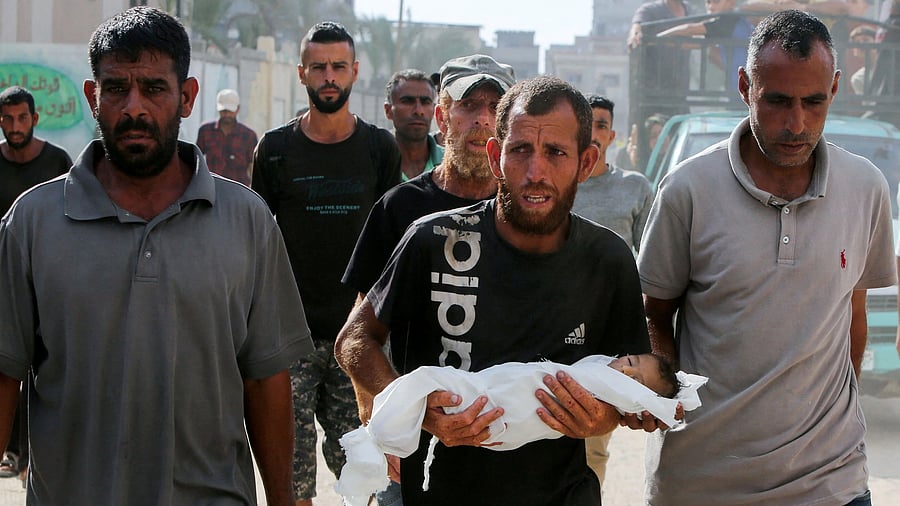
Palestinian father Fadi Al-Najjar mourns his three-month-old baby Yehia, who died due to malnutrition amid a hunger crisis, according to medics, outside Nasser Hospital in Khan Younis, in the southern Gaza Strip July 20, 2025. REUTERS/Hatem Khaled
GAZA: Ibrahim al-Najjar said he lost his five-year-old son Naim to malnutrition that is ravaging Gaza. One year later, he is still grieving while scrambling to ensure his other children do not suffer the same fate.
"This child will follow him," the Palestinian former taxi driver said, pointing to his 10-year-old son Farah. "For about a month he's been falling unconscious. This child was once double the size he is now."
Najjar, 43, held up a medical certificate that shows Naim died on March 28, 2024. The entire family has been displaced by nearly two years of Israeli air strikes. Once used to eating three meals a day before the war broke out in October 2023—after Hamas-led Palestinian militants attacked Israel—they can now only dream of even basic staples like bread, rice, fruit, and vegetables.
Naim's brother Adnan, 20, now devotes himself to taking care of his surviving siblings. Each day, he wakes at 5:30 a.m. and carefully picks his way through Gaza’s endless rubble in search of a soup kitchen, while airstrikes continue nearby.
"I swear I don’t have salt at home, I swear I beg for a grain of salt," said Naim's mother Najwa, 40.
"People talk about Gaza, Gaza, Gaza. Come see the children of Gaza. Those who do not believe, come see how Gaza’s children are dying. We are not living, we are dying slowly," she said.
The Gaza health ministry said five more people died of malnutrition and starvation in the last 24 hours, bringing the total number of such deaths since the war began to at least 193 Palestinians, including 96 children.
"The Famine Scenario"
A global hunger monitor has warned that a famine scenario is unfolding in Gaza. Starvation is spreading, children under five are dying from hunger-related causes, and aid organisations say humanitarian access remains severely restricted. The warnings from international agencies have only grown louder.
According to the United Nations Office for the Coordination of Humanitarian Affairs (OCHA), food consumption across Gaza has dropped to its lowest levels since the war began. Over 81% of Gaza’s 2.2 million residents now report poor food consumption, a sharp increase from 33% in April.
“Nearly nine out of ten households resorted to extremely severe coping mechanisms to feed themselves, such as taking significant safety risks to obtain food, and scavenging from the garbage,” OCHA said in a recent statement.
Even for those not too weak to reach aid collection points, the chaos and desperation can be just as deadly. Many risk injury or death in the scramble for limited food supplies. Between June and July, the number of malnutrition-related medical admissions nearly doubled, from 6,344 to 11,877, according to UNICEF's latest available data.
Meanwhile, prospects for a ceasefire remain bleak. Three Israeli officials said the country’s military chief has pushed back against Prime Minister Benjamin Netanyahu’s plans to seize areas of Gaza not yet under Israeli control. Netanyahu has vowed to continue the war until Hamas is completely destroyed. The militant group’s 7 October attack killed 1,200 people and took 251 hostages, according to Israeli figures.
Israel’s military response has killed over 60,000 people, according to Gaza health authorities, and reduced much of Gaza to rubble. Many remain buried under the debris, with entire neighborhoods now flattened.
‘The Shadow of Death’
Holding her emaciated baby Ammar, who she said is wasting away from malnutrition, Amira Muteir, 32, pleaded with the world to come to the rescue.
"The shadow of death is threatening him, because of hunger," she said, adding that he often goes without milk for up to 20 days a month, and she waits for hours at a hospital for fortified solution.
Due to the shortage of clean water, she said Ammar sometimes has to drink polluted liquids. The family survives on a single daily plate of food from a charity soup kitchen.
"We eat it throughout the day and until the following day we eat nothing else," she said.